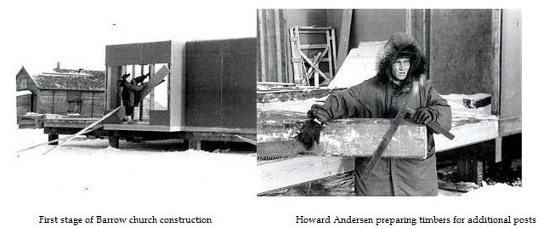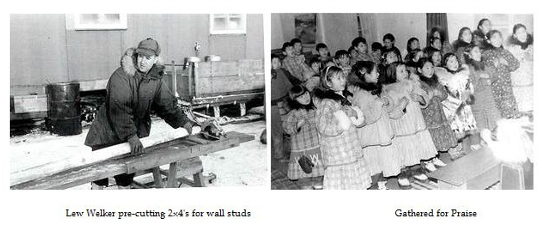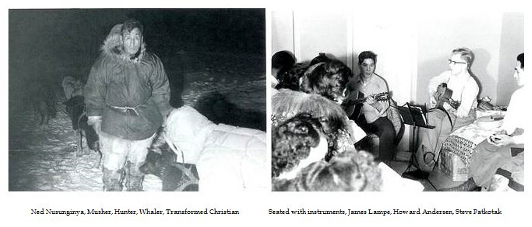
ANOTHER COFFEE BREAK: 40 YEARS BELOW ZERO, Part 7
January
15, 2016
Every so often I talk about one of our granddaughters,
Jessica. Periodically, she will come to spend a few days with us, and
there have been times when we get to enjoy her rather remarkable and unusual
humor.
In many ways, Jessica was just like I was at age 5. (She
is now almost 14 years old.) When we lived in south Texas, her mom would
drop her off on her way to her college classes. First thing she did when
she came into my office was to look for my coffee cup. If there was some
coffee in it, whether cold or hot, she'd immediately take a sip. (I used
to do the same thing at age 5.) One
day, age 5, you know), she did just that. Then she
comes out with a real corker! "I was hungry and you gave me coffee to drink," she says, deliberately misquoting from Jesus'
statement in Matthew 25:45,"For I was an hungered, and ye gave me meat."
" Brother!
Did I ever do a double-take! Then she continues,“Inasmuch as you have done it unto one of the least......" Then she broke up
laughing. So did I.
And she was only five years old? Yikes! Look out,
World! A very different kind of Jessica is coming!
And today's coffee -- if you're done laughing -- is some very
rich dark-roasted Columbian. The French Press is full and running over,
and I need to pour me a cup. Back in a second.
OK, got yours yet?
When
we finished last week, I was saying that my brother and I enrolled at
Burnhamthorpe Collegiate Institute in Toronto (and stayed with some friends who
lived in Toronto) while our parents headed south to Texas.
Travels
throughout Texas and ministering in the dozens if not hundreds of churches that
Dallas pastor, Lonnie Mullen, opened up through his contacts, resulted in an
outpouring of help in many ways. Apart from the financial assistance and
gifts given to Dad and Mom for the expansion of the church in Barrow, a literal
army of prayer warriors assembled to stand behind their ongoing ministry.


When
we finally returned to Barrow in the late summer of 1958, the materials for the
expansion had been ordered and paid for. During our absence, the move of
the Holy Spirit across the arctic had flourished under Paul & Marguerite
Bills to the extent that we were being asked to build churches at Kaktovik (on
Barter Island in the Arctic Ocean) near the Canadian border, Wainwright (which
was 90 miles from Barrow) and Point Hope (which is the farthest northwest
community in Alaska.
Before
that could happen, however, the Barrow church needed expansion, and the Holy
Spirit had some things in the works none of us could have expected in our
wildest fancies. Well, OK, maybe we should have, but in an era when the
publicly miraculous seemed mostly relegated to William Branham (my mother’s
best friend was his translator in the Scandinavian countries), Oral Roberts'
tent crusades, R. W. Schambach, T. L. Osborn and a small group of
faith-teaching evangelists.
What
we saw was a state of spiritual hunger in people that the Lord simply could not
and would not miss fulfilling. The first Sunday that we had the
auditorium enlarged and ready to meet more folks, the place was packed like it
was when the church first opened its doors.
During
our absence from Barrow, one of the Eskimo men who had come to know Jesus Christ
and had been baptized in the Holy Spirit was -- by Alaskan standards anyway --
relatively famous. His name was Ned Nusunginya. I don't know how
many of you are bookworms, or have been into reading arctic adventure stories,
but perhaps you've heard of a book about a dog named Balto who was the lead dog
in a team that rushed serum to Nome during a diphtheria epidemic in 1925.
More
than 20 mushers participated in a run to get the serum to Nome from
Anchorage. Ned Nusunginya was one of those mushers. He later
repeated the adventure in getting serum to other communities in the arctic
during deadly blizzard conditions. That original run from Anchorage to
Nome has been immortalized in arctic sports through the Iditarod dog race which
is run now annually following pretty much the same route that carried the serum
to Nome.
As
Ned had grown throughout the years, he had developed a hatred for
"Whitey," or "tunniks," as most arctic natives used to
refer to white folks. Although the term has generally come to be used
nowadays with reference to any newcomer, white or otherwise, just as the term
"cheechako" is used in the interior of Alaska, in early years, the
term, "tunnik," was a very racist term meaning "dirty white
man." Though he managed to keep his racist feelings mostly to
himself in his work environment (he climbed the ladder of responsibility
working his way to a supervisory position for the DEW Line -- Distant Early
Warning radar system), he also had become an alcoholic.
Thus
when Ned would drink, he was pretty free with his "colorful
metaphors" and thought nothing of cursing the "tunniks" he
worked with and belittling their labors. Over the years, alcohol and
tobacco began to take their toll on Ned and his health deteriorated.
When, just past his 60th birthday, he was introduced to a real relationship
with Jesus Christ and subsequently baptized in the Holy Spirit, the change in
him was so dramatic as to stun those who had known him throughout his life, and
those who worked with him on a daily basis. More than that, he was healed
of cirrhosis of the liver, heart problems and numerous other physical ailments.
Ned
became the picture of health. He also became Dad's interpreter when he
preached to natives who spoke or understood little English. Dad had been
studying the Inupiat language and Ned began to work with him on a daily basis
to help him through his pronunciation problems. FYI, the Inupiat language
is extremely guttural, and in some ways matches the Hebrew language for
breathing and articulation.
One
Sunday morning, Dad decided to begin experimenting with his use of the Inupiat
tongue while Ned was standing beside him. He had just preached a strong
evangelistic message and bowed his head in preparation to pray.
"Unjgaiuta," he said, putting the accent on the "u."
Ned nearly dropped his false teeth, trying to contain himself. He
regained his composure and said quietly, "Unjgaiuta," correcting the
pronunciation and putting the accent on the "ai" sound (pronounced
like a long "i").
I
was sitting behind them with my guitar in hand and caught the correction.
I turned to my brother, Howie, who also had his guitar, and grinned. We
both knew that what Dad had said was, "Let's dance," when he meant to
say, "Let us pray." There were more than a few smiles
throughout the gathering that morning. Nevertheless, those who realized
the struggle Dad was going through to learn their language were more than
appreciative of his effort.
When
the service ended, Ned did something no one could ever remember his doing in
his whole lifetime. He turned to Dad, put his arms around him and said,
"Brother Capener, I love you." It was a demonstration of the
radical change that had taken place in him when the Lord Jesus Christ had
transformed Ned Nusunginya from a man of hatred, vengeance and continual
vitriol to a man who exhibited nothing but the agape love of
the Lord.

The
move of the Holy Spirit in Barrow began to take on exhibits and manifestations
none of us had ever seen. One night there was a huge clamor outside the
building. Nightly services had resumed after a hiatus during our absence
from Barrow, and this was in the middle of the week. The church building
was packed beyond capacity. People had been being baptized in the Holy
Spirit in the midst of services and began to speak in tongues worshiping the
Lord spontaneously. The heat from so many bodies packed into the place
more than offset the fact that the main doors were open to accommodate folks
who couldn't get in. They stood on the steps to the front of the church
trying to see what was going on.
Those
who couldn't see over the heads of people crammed into the entry way decided on
another tack. They took some empty 50-gallon oil drums, laid 2x12 planks
across them and made themselves an elevated platform on both sides of the
church so they could stand up and see through the windows.
Alaska
was not yet a state so we had a territorial police officer who made alternate
rounds in Barrow (and other communities scattered throughout the arctic) on an
exchange basis with a Canadian RCMP officer whose duties included Tuktoyaktuk,
Inuvik, Aklavik and other villages in the western Canadian arctic. On the
night in question, the noise and excitement was so great surrounding the church
that the officer came to check things out. Whether the light appeared
before he came, or whether it came while he was there, a great shaft of light
appeared in the sky shining down directly over the church building, not unlike
the pillar of fire that traveled with the children of Israel in the wilderness.
The
light was visible for miles around as a manifestation of what the Holy Spirit
was doing. Stephen Patkotak, oldest son of Paul Patkotak (I will share
his story, shortly) had rebelled against the Lord, blaming God for the
persecution his father had undergone at the hands of people scattered
throughout the arctic including would-be "Christians." Steve
was on a caribou hunting trip some 20 miles from Barrow when he saw the shaft
of light. Despite his long-harbored anger against the Lord and everything
"Christian," there was an instant "knowing" in his being
that the Lord was beckoning him.
His
wife, Jane, was in the service that night. She had come to know Jesus
Christ while her husband was gone on his hunting trip and had been filled with
the Holy Spirit. She was praying for Stephen's salvation. You
probably realize this, but one does not cover 20 miles on tundra through
snowdrifts with a dog team as though they're driving a snow machine capable of
doing 50 or 60 miles an hour. I'm not sure Steve ever knew how it
happened, but he turned his dog team towards the light and headed towards
Barrow as fast as he could drive those dogs.
It
was somewhere between 9:30 and 10:00 PM when he pulled up in front of the
church with his team, drove a claw anchor into the ground to keep his dogs from
running away. He'd made the trip in 90 minutes or thereabouts. With
absolute determination, he plowed his way through the crowd of people, made his
way down to the front of the church and dropped to his knees weeping.
When he rose to his feet some 30 - 45 minutes later, the anger and rebellion
against God was gone. His countenance was changed completely, and he
glowed as though radiating inner light from himself.
Stephen
had two brothers, Simeon and Billy. Billy lived in Wainwright where his
father still lived. Simeon lived right next door to the church. In
fact, if you look at the picture above of the church under construction, you'll
see a house in the left side of the picture. That was Simeon's
place. In fact, it belonged to a woman whose husband had died, and Simeon
had simply taken up with her without the
benefit of marriage. Simeon was a full-blown alcoholic who couldn't even
get out bed without first taking a swig from his bottle of
whiskey.
One
morning the woman's (her name was Susan) daughter, Mary, came banging on the
door of our place and crying out for help. She said that Simeon had an
axe in hand and was trying to kill her mother. Dad walked over to the
house, and as he stepped through the door, Simeon had the axe upraised.
He turned to swing the axe against Dad instead. Dad stood there, raised
his hand toward Simeon and said, "Peace, be still."
The
axe dropped to the floor harmlessly. Simeon followed the axe to the
floor, falling on his knees and crying. Dad began to pray softly,
declaring the name and the blood of Jesus over Simeon and over the entire
household. Before he left the house, Simeon and Susan had both received Jesus
Christ as their Lord and Savior. They were married soon thereafter.
Both
Steve and Simeon Patkotak became integral parts of the church in Barrow.
Both were musicians (both of them played the banjo) and began playing their
instruments in what was quickly becoming a burgeoning string band.
There’s
a still lot to tell, and rather than get started on another story of God's
grace today and the outpouring of the Holy Spirit that brought such change to
the arctic, let's leave it here for today.
See
you next week.
I remind those of you
in need of ministry that our Healing Prayer Call takes place on Mondays at 7:00
PM Eastern (4:00 PM Pacific). Our call-in number has changed to (712) 775-7035. The new Access Code
is: 323859#.
For Canadians who have difficulty getting in to
this number, you can call(559) 546-1400. If someone answers and asks what your
original call-in number was, you can give them the 712 number and access code.
At the same time, in
case you are missing out on real fellowship in an environment of Ekklesia, our
Sunday worship gatherings are available by conference call – usually at about
10:45AM Pacific. That conference number is (605) 562-3140, and the access code is 308640#. We hope to make these gatherings available by Skype or
Talk Fusion before long. If you miss the live call, you can dial (605) 562-3149, enter the same access code and listen in
later.
Blessings
on you!

Regner
A. Capener
CAPENER MINISTRIES
RIVER
WORSHIP CENTER
Sunnyside, Washington 98944
Email
Contact: Admin@RiverWorshipCenter.org
All
Coffee Break articles are copyright by Regner A. Capener, but authorization for
reprinting, reposting, copying or re-use, in whole or in part, is granted
–provided proper attribution and this notice are included intact. Older Coffee
Break archives are available at http://www.RegnersMorningCoffee.com. Coffee Break
articles are normally published weekly.
If you would like to have these articles arrive each morning in your email,
please send a blank email to: Subscribe@AnotherCoffeeBreak.com.To remove yourself
from the mailing list, please send a blank email to Unsubscribe@AnotherCoffeeBreak.com.
CAPENER
MINISTRIES is a tax-exempt church ministry. Should
you desire to participate and covenant with us as partners in this ministry,
please contact us at either of the above email or physical addresses, or
visit: http://www.RiverWorshipCenter.org.
